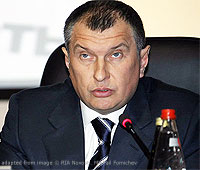The return of Sechin: An apparent compromise in a government rivalry places Putin’s key ally back in the picture

(Moscow News – themoscownews.com – Anna Arutunyan – October 15, 2012) President Vladimir Putin has reportedly okayed a plan by the state-owned Rosneft oil company to buy BP’s 50 percent stake in TNKBP and this may be part of a larger compromise with Putin’s key ally, Igor Sechin, who controls Rosneft.
That compromise, analysts said, could affect everything from Russia’s budget policy to a proposed plan to privatize state assets in the energy sector.
Sechin told The Financial Times last Wednesday that Putin had supported the deal in September during a meeting with Sechin and BP executives but there was no confirmation from the Kremlin.
Putin’s evident backing was revealed just days after a directive was signed by Prime Minister Dmitry Medvedev’s government on Oct. 4, stripping Rosneftegaz, the state investment vehicle chaired by Sechin, of some $1.6 billion in dividends. The directive was signed by Deputy Prime Minister Arkady Dvorkovich, a Sechin rival and a key proponent of a plan to privatize assets in the energy sector. Dvorkovich’s directive would in effect prevent Rosneftegaz from snapping up stakes in energy companies, something that Sechin has long been lobbying for.
In the interview, Sechin conceded that he was giving up on plans to consolidate state energy assets under Rosneftegaz suggesting that he had in fact been dealt a blow by Medvedev’s government.
“There is a major confrontation, or debate, going on between the deputy prime minister [Dvorkovich] and Sechin, and TNK BP is part of this,” Dmitry Abzalov, a senior analyst at the Center for Political Trends, told The Moscow News.
According to Abzalov, some of TNK-BP’s Russian shareholders, Abzalov said, are close to Dvorkovich these include billionaire Viktor Vekselberg. “So [a potential BP-Rosneft] deal could be seen as part of a compromise,” he said.
If Sechin gains control of 50 percent of TNK-BP, then the others would lose their leverage in the company, Abzalov said.
Earlier this month, Sechin had said that any government directive would have to be approved by the Kremlin, i.e. by Putin himself.
This was no surprise by giving up part of Rosneftegaz dividends, Sechin was losing the opportunity for Rosneftegaz to consolidate control over energy assets like RusHydro and Inter RAO. And while the $1.6 billion in Dvorkovich’s directive was short of the 95 percent of the dividends that Medvedev’s government had earlier proposed taking from Rosneftegaz, it was still a big chunk of the $4.3 billion that Rosneftegaz had accumulated. Some of the $1.6 billion would go to raise capitalization for RusHydro, but without Rosneftegaz getting any control of the company.
“The deal with TNK-BP would be one in Sechin’s favor, while the dividends directive clearly boosts the position of [Medvedev’s] government,” Abzalov said. The dividends would be used to finance not just RusHydro, but several of Putin’s campaign promises in the social sphere, such as pension reform.
It was unclear whether this directive, however, had Putin’s approval tacit, or otherwise.
“In practice, directives for dividends do not need to be agreed with the [presidential] administration,” Kommersant quoted an unnamed aide to Dvorkovich as saying. Putin’s spokesman Dmitry Peskov agreed, but added that that Rosneftegaz was an exception. “There is, however, a presidential decree that gives Rosneftegaz a strategic status, and in this case it will continue to be coordinated with the government,” Kommersant quoted him as saying.
“It’s an open question,” Abzalov said, adding that Putin had evidently not given the final green light for the dividends to be transferred to the budget. “Possibly, Dvorkovich is trying to act independently.”
Others argued, however, that being partially stripped of its dividends would not prevent Rosneftegaz from investing.
“The company would still have the opportunity to invest in energy assets,” Grigory Birg, a senior analyst with InvestCafe told The Moscow News. By acquiring a stake in TNKBP, Rosneft would be consolidating its positions elsewhere, he said.
On the whole, Sechin was expanding his positions rather than losing influence, Birg suggested.
In a separate development, Sechin met last week with another long-time rival, Gunvor co-owner Gennady Timchenko also reputed to be an old friend of Putin. The two were shown embracing warmly and while no concrete deals came out of the meeting, the two discussed joint oil exploration deals, Vedomosti reported.
Sechin reportedly had a falling out with Timchenko whose Gunvor trades oil over both personal and business reasons. One of the reputed reasons, a source close to Sechin and Timchenko told Vedomosti, was that Timchenko lived like a “legal billionaire,” while Sechin “works like a [slave] day and night.” Both sides have denied any conflict, however.
But a possible TNK-BP deal would strengthen Rosneft’s global positions and sweeten the pill for Sechin, analysts said.
